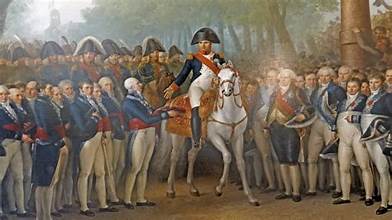Napoleon Bonaparte, born in 1769, emerged as one of the most significant figures of the late 18th and early 19th centuries, leaving an indelible mark on European history. Renowned for his military acumen, political astuteness, and transformative reforms, Napoleon’s legacy remains a subject of study and debate among historians and scholars worldwide.
Military Genius
Napoleon’s military campaigns, characterized by bold maneuvers and innovative tactics, reshaped the landscape of Europe. His victories, such as those at Austerlitz, Jena, and Marengo, demonstrated his mastery of strategy and his ability to exploit the weaknesses of his adversaries. Napoleon’s use of combined arms tactics, rapid troop movements, and centralized command structures set new standards for warfare and cemented his reputation as a military genius.
Political Leadership
Beyond the battlefield, Napoleon proved himself a shrewd and pragmatic statesman. After seizing power in the coup of 18 Brumaire, he instituted a series of reforms aimed at consolidating his authority and modernizing France. The Napoleonic Code, a comprehensive legal system based on principles of equality and meritocracy, remains one of his most enduring legacies. Additionally, Napoleon centralized government administration promoted education, and initiated infrastructure projects, laying the groundwork for a more efficient and cohesive state.
European Impact
Napoleon’s ambitions extended far beyond France’s borders, as he sought to establish a pan-European empire under French hegemony. His conquests and alliances reshaped the geopolitical landscape, redrawing boundaries and toppling old regimes. While Napoleon’s rule brought political stability and progressive reforms to many regions, it also sparked fierce resistance and nationalist uprisings across Europe. The Napoleonic Wars, spanning over two decades, exacted a heavy toll on lives and resources, ultimately leading to his downfall.
Legacy and Controversy
Napoleon’s legacy is multifaceted and subject to interpretation. To some, he is a visionary leader who brought order and progress to a continent ravaged by war and instability. To others, he is a power-hungry dictator whose ambitions led to widespread suffering and devastation. The Napoleonic era marked a pivotal juncture in European history, influencing political ideologies, military doctrines, and social movements for generations to come.
Napoleon Bonaparte’s strategic brilliance, political innovations, and enduring impact on European history ensure his place among the most consequential figures of the modern era.







